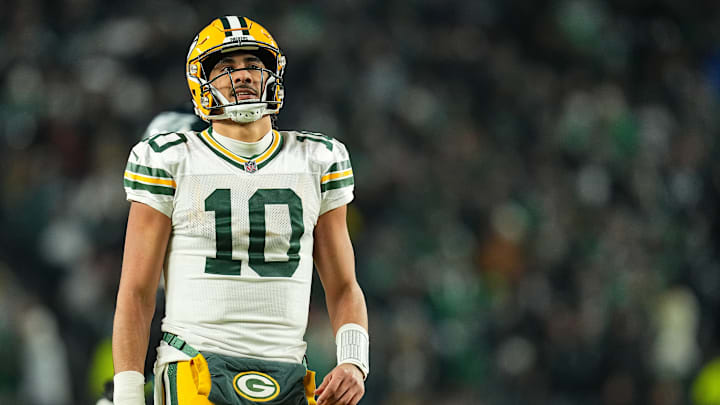Progress isn't always linear. The Green Bay Packers' young team showed Super Bowl potential a year ago, leading to skyrocketing expectations this season. They only heightened after the Packers handed Jordan Love a $220 million extension.
Outside of Josh Jacobs' impact on the run game, the Packers' offense didn't make the strides many expected. Love didn't take that next step.
The season was a tale of two halves. In the first eight games, Love battled injuries but showed his ability as a playmaker with 16 touchdown passes. The issue was that he also tossed 11 interceptions. He eventually cleaned up the turnovers, going interception-free in the final seven games, though it came at the expense of his big-time plays, as he threw just nine touchdown passes.
In the playoff loss to the Philadelphia Eagles, the negatives of both worlds collided. The passing game was completely out of sync and the turnovers returned, with Love throwing for 212 yards, zero touchdowns, and three interceptions.
It leaves Love and the Packers with more questions than answers entering the offseason.
Matt LaFleur has to figure out how Jordan Love can reach the next level in 2025
Love isn't going anywhere. The Packers committed their long-term future to him last offseason, and for good reason. He is still their franchise quarterback. After the game, head coach Matt LaFleur praised Love but spoke about the need to keep improving.
"I love Jordan Love and how he competes, the work he puts in. I think he's going to get better and better and better," said LaFleur. "Certainly, there are some lessons along the way, tough lessons when you end up in defeat. That's hard to deal with. He is very critical of himself. He does such a great job of learning from every experience. Through this, I think we'll all be better for it."
That final part is critical. LaFleur needs to reflect on the season, figure out what went wrong, and construct a plan to help Love reach the next level.
RELATED: 5 Packers who definitely won't be back after playoff loss to Eagles
LaFleur adopted a run-heavy offense as the season progressed. Love averaged 32.1 pass attempts in his opening eight games but just 24 per contest in the final seven. Was this injury-related? Did LaFleur lose trust in Love because he turned the ball over too often?
Whatever the reason, his solution didn't work. The Packers became too much of a dink-and-dunk, run-at-all-costs offense, and it prevented Love from producing the magical big plays we have become accustomed to. According to Pro Football Focus, Love's number of big-time throws dropped from 37 in 2023 to just 16 this season.
LaFleur must figure out the offense's identity with Love. For example, their use of play-action was baffling. In theory, leaning on Josh Jacobs should've led to more explosive plays through the air.
Instead, Love regressed in this area. Per PFF, Love attempted 58 fewer play-action passes, had half as many touchdowns (12 to 6), and his completion percentage dropped from 72.2 to 61.3. The most head-scratching takeaway is that the Packers went away from play-action in a season where it should've worked perfectly.
Love also retained several frustrating traits from last season, including throwing off his back foot when he had opportunities to step into throws.
The Packers' next step could be to target a new wide receiver. None of the Packers' talented young group broke out this year, and general manager Brian Gutekunst may need to prioritize the position.
Love has the tools to become an elite quarterback, but he isn't there yet. Progress isn't always linear, as the Packers have learned this season, and it's certainly not time to give up.
It's now up to LaFleur to help his quarterback reach the next level.
